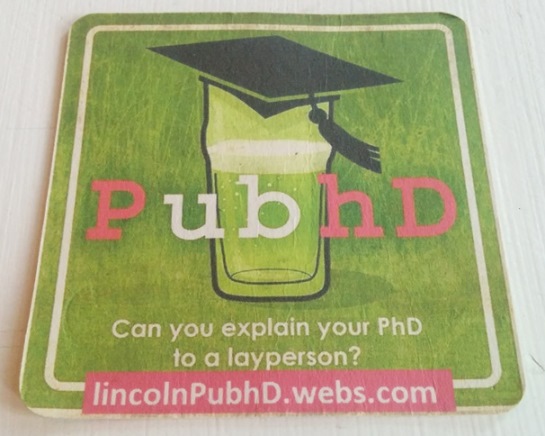The first PubhD event went very smoothly and the audience seemed to enjoy it. The format worked and it was a very interesting evening.
But what did the speakers think?
Well, we asked them for feedback and here are their responses:
Sera:
I really did get a lot out of the PubhD event last week. It was not only fantastic practice with my own material as I’m working on tweaking this at the moment, but also I wanted to do it for confidence reasons (as I’m preparing for my viva exam later this year). The audience was really great with their interest and questions, but I appreciated the level of the presentation because academics get too caught up in their own world. The idea of having the talk alongside a pint sounded best to me and I’m sad that tomorrow evening I’m not likely to be repeating this although my presentation will be held around the corner from a pub. Drats!
Dave:
It was good to chat to a slightly older audience than I normally do with my outreach activities, which are often family focussed. This allowed me to relax a bit and present in a style closer to how I actually am. I don’t normally get to do that, it scares the kids 🙂
The first PubhD event went down as smoothly as the free beer I was plied with. The set up was well suited to the concept – a back room in a pub crowded with interesting folk. All three talks seemed well received by the audience and it was great to see so many questions (of such sophisticated content) being asked. As a speaker, I particularly liked seeing how the other speakers chose to present their subject areas and this has given me some ideas in terms of how I might present in the future. Presenting such isolated and specialised research to ‘lay people’ is helpful in terms of building confidence and learning how to transfer knowledge in different ways to diverse audiences. It is my belief that a true specialist – an expert – should be able to successfully inform anybody of their subject area. Being able to do this represents a real closeness and an intricate understanding of the subject area. PubhD represents a forum for experts to truly test their knowledge, to gain experience presenting, and to be witty, sophisticated, and drunk all at the same time. No complaints from me!
So, no complaints from the audience or the speakers!
We also recorded a 10 minute chat with the three speakers for The Pod Delusion. It starts about half way in (on 31 minutes):


